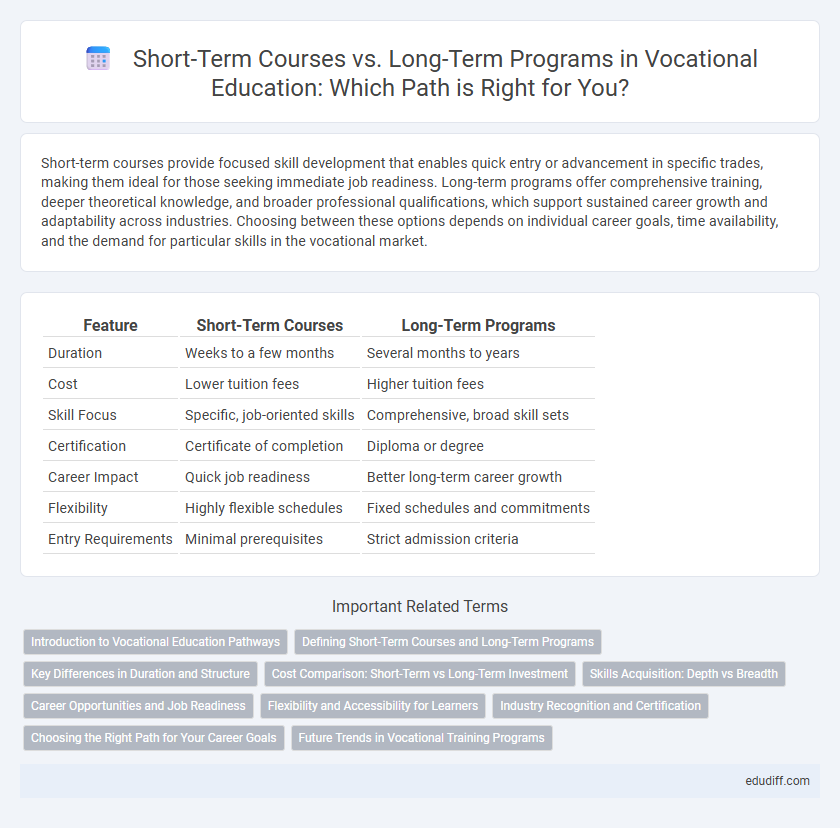Short-term courses provide focused skill development that enables quick entry or advancement in specific trades, making them ideal for those seeking immediate job readiness. Long-term programs offer comprehensive training, deeper theoretical knowledge, and broader professional qualifications, which support sustained career growth and adaptability across industries. Choosing between these options depends on individual career goals, time availability, and the demand for particular skills in the vocational market.
Table of Comparison
| Feature | Short-Term Courses | Long-Term Programs |
|---|---|---|
| Duration | Weeks to a few months | Several months to years |
| Cost | Lower tuition fees | Higher tuition fees |
| Skill Focus | Specific, job-oriented skills | Comprehensive, broad skill sets |
| Certification | Certificate of completion | Diploma or degree |
| Career Impact | Quick job readiness | Better long-term career growth |
| Flexibility | Highly flexible schedules | Fixed schedules and commitments |
| Entry Requirements | Minimal prerequisites | Strict admission criteria |
Introduction to Vocational Education Pathways
Short-term courses in vocational education offer focused skill-building and quicker entry into the workforce, typically ranging from a few weeks to several months. Long-term programs provide comprehensive training, often including theoretical knowledge and practical experience over one to two years or more, preparing students for advanced certifications and broader career opportunities. Choosing between these pathways depends on individual career goals, time availability, and the desired depth of expertise in a specific vocational field.
Defining Short-Term Courses and Long-Term Programs
Short-term courses are intensive educational programs designed to provide specific skills and knowledge within a limited timeframe, typically lasting from a few weeks to a few months. Long-term programs encompass comprehensive curricula that span several months to years, aiming to deliver in-depth expertise and broader qualifications. Vocational training in short-term courses focuses on immediate job readiness, while long-term programs emphasize sustained skill development and career advancement.
Key Differences in Duration and Structure
Short-term courses typically range from a few weeks to a few months, offering focused, skill-specific training that caters to immediate job requirements or skill upgrades. Long-term programs extend from several months to years, providing comprehensive education with in-depth theoretical knowledge and practical experience across broader vocational fields. The duration and structure differences affect curriculum depth, learning pace, and certification value, influencing career advancement and specialization opportunities.
Cost Comparison: Short-Term vs Long-Term Investment
Short-term vocational courses typically involve lower upfront costs, making them more accessible for individuals seeking quick skill acquisition without significant financial commitment. Long-term programs often require higher tuition fees and additional expenses such as materials and living costs but provide greater depth of knowledge and potential for higher earnings over time. Evaluating cost per credit hour and potential return on investment helps learners determine the most financially viable option for their career goals.
Skills Acquisition: Depth vs Breadth
Short-term courses offer focused skills acquisition targeting specific competencies, enabling rapid application in vocational settings. Long-term programs provide comprehensive knowledge and deeper understanding across multiple skill areas, fostering versatility and advanced expertise. Employers often value short-term courses for immediate skill gaps, while long-term programs develop foundational abilities critical for career advancement.
Career Opportunities and Job Readiness
Short-term vocational courses provide focused skill development, enabling faster entry into the job market and immediate application in specific trades like healthcare support or IT certification. Long-term programs offer comprehensive training and theoretical knowledge, preparing students for advanced roles and career growth in fields such as engineering, nursing, or business management. Employers often value long-term credentials for leadership positions, while short-term certifications are favored for roles prioritizing practical expertise and rapid job readiness.
Flexibility and Accessibility for Learners
Short-term courses offer greater flexibility by allowing learners to quickly acquire specific skills on their own schedule, making them accessible to working professionals and those with limited time. Long-term programs provide comprehensive knowledge but often require a fixed commitment, which can limit accessibility for individuals balancing work or personal responsibilities. Online and hybrid learning formats enhance accessibility for both short-term and long-term options, catering to diverse learner needs.
Industry Recognition and Certification
Short-term courses offer quick, targeted skills training often recognized by specific industry certifications that enhance immediate employability. Long-term programs provide comprehensive knowledge and widely accepted certifications that are valued across multiple sectors and promote career advancement. Both paths align with industry standards, but long-term programs typically carry greater recognition for professional development and credibility.
Choosing the Right Path for Your Career Goals
Short-term courses offer focused skill development and quick certification, ideal for individuals seeking rapid entry or advancement in specific vocational fields such as digital marketing or welding. Long-term programs provide comprehensive knowledge and deeper expertise, beneficial for careers requiring extensive training and qualifications, like nursing or engineering. Evaluating your career goals, time availability, and industry demands ensures the right educational path aligns with professional growth and job market trends.
Future Trends in Vocational Training Programs
Vocational training programs are increasingly integrating technology-driven short-term courses to address rapid skill demands in industries like AI, renewable energy, and healthcare. Long-term programs continue to evolve by embedding modular learning paths and micro-credentials, enhancing flexibility and stackable qualifications for career advancement. Future trends emphasize hybrid learning models and industry partnerships that align curriculum with real-time job market needs and emerging occupational roles.
Short-Term Courses vs Long-Term Programs Infographic

 edudiff.com
edudiff.com